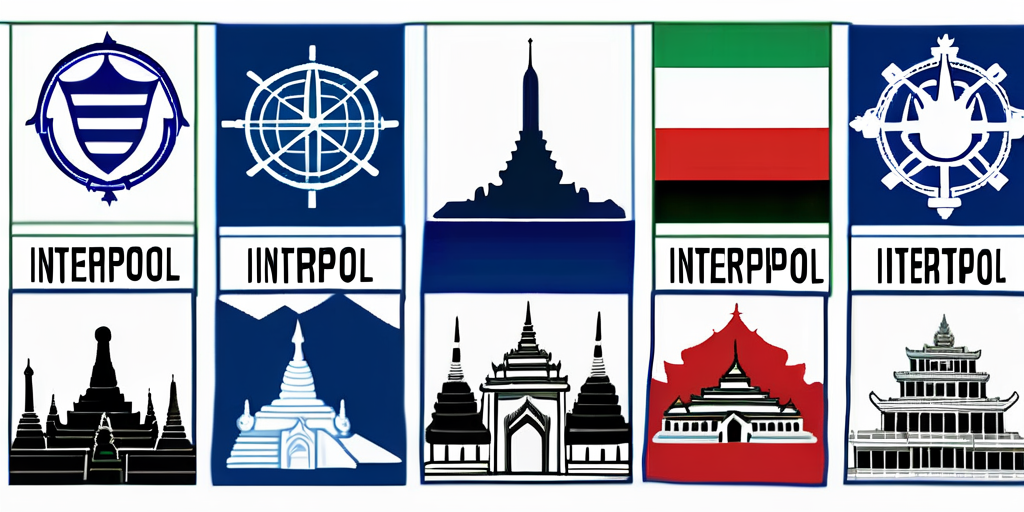Myanmar’s engagement with Interpol, the International Criminal Police Organization, has been a significant step towards strengthening its law enforcement capabilities and enhancing international cooperation in crime fighting. Understanding Interpol’s role in Myanmar is crucial to grasp the impact it has had on the country’s criminal justice system. This article aims to delve into the history of Interpol in Myanmar, explore its current activities, analyze the challenges it faces, and discuss its future prospects.
Understanding Interpol’s Role in Myanmar
The History of Interpol in Myanmar
In order to comprehend Interpol’s impact on Myanmar’s law enforcement, it is essential to examine its historical engagement. Myanmar became a member country of Interpol in 1973. Since then, Interpol has played a crucial role in facilitating cooperation between Myanmar and other nations in combating transnational crimes such as drug trafficking, human trafficking, and cybercrime.

Myanmar’s membership in Interpol has not only strengthened its ties with the international law enforcement community but has also provided the country with access to a vast network of resources and expertise. Through Interpol, Myanmar has been able to tap into a wealth of knowledge and best practices, enabling its law enforcement agencies to enhance their capabilities in tackling complex and cross-border criminal activities.
Over the years, Interpol has helped Myanmar establish various mechanisms to enhance communication and coordination among its law enforcement agencies. These mechanisms have proved invaluable in streamlining investigative processes and supporting the country’s efforts in combating cross-border criminal activities.
Interpol’s Current Activities in Myanmar
Interpol’s current activities in Myanmar are centered around providing technical assistance, capacity building, and training programs to strengthen the country’s law enforcement capabilities. Interpol has been actively involved in conducting workshops and seminars on various areas of crime prevention and detection, emphasizing the importance of international cooperation.
One of the key areas of focus for Interpol in Myanmar is combatting human trafficking. Myanmar has been identified as a source, transit, and destination country for human trafficking, particularly involving women and children. Interpol’s initiatives in this area include training programs for law enforcement officers, border control agencies, and social workers to enhance their skills in identifying and assisting victims of human trafficking.
Additionally, Interpol has been instrumental in supporting Myanmar’s efforts in utilizing advanced technologies for combating crime. Through its network and resources, Interpol assists Myanmar in leveraging digital forensics, cybercrime investigations, and intelligence sharing, empowering the country’s law enforcement agencies to stay ahead in the ever-evolving landscape of criminal activities.
Moreover, Interpol’s collaboration with Myanmar extends beyond law enforcement agencies. The organization also works closely with non-governmental organizations (NGOs) and civil society groups to raise awareness about the importance of combating transnational crimes and to provide support to victims. This multi-stakeholder approach ensures a comprehensive and holistic response to the challenges faced by Myanmar in the realm of international crime.
The Impact of Interpol’s Work on Myanmar’s Law Enforcement
Strengthening Myanmar’s Criminal Justice System
Interpol’s engagement with Myanmar has played a vital role in strengthening the country’s criminal justice system. By providing technical expertise and sharing best practices, Interpol has contributed significantly to the professional development of Myanmar’s law enforcement personnel.

Furthermore, Interpol’s training programs have helped improve the knowledge and skills of Myanmar’s law enforcement agencies, enabling them to tackle complex criminal cases more effectively. This has resulted in enhanced investigative capabilities, leading to higher conviction rates and increased public trust in the criminal justice system.
Enhancing International Cooperation in Crime Fighting
Interpol’s engagement has fostered close cooperation between Myanmar and other member countries in tackling transnational crimes. Through its extensive network, Interpol facilitates the exchange of intelligence, cooperation in joint operations, and the extradition of fugitives.
By actively participating in Interpol’s initiatives, Myanmar has been able to effectively collaborate with other countries in cracking down on international criminal syndicates. Joint efforts have yielded notable successes in dismantling drug trafficking networks, apprehending human traffickers, and combating cybercrime.
Challenges Faced by Interpol in Myanmar
Political Instability and Its Effects on Interpol’s Operations
Political instability in Myanmar has posed challenges to Interpol’s operations within the country. Periods of unrest and political transitions can disrupt the continuity of Interpol’s initiatives, hindering the progress made in enhancing law enforcement capabilities.

However, it is important to note that despite the challenges, Interpol has remained committed to supporting Myanmar and has adapted its strategies to navigate the evolving circumstances.
Dealing with Corruption within the Law Enforcement Agencies
Corruption within law enforcement agencies has been another obstacle that Interpol has encountered in its engagement with Myanmar. Corruption undermines the effectiveness and credibility of the criminal justice system, hindering Interpol’s efforts to combat crime effectively.
Recognizing the damaging effects of corruption, Myanmar has been working towards implementing anti-corruption measures and advocating transparency within its law enforcement agencies. Interpol’s role in providing guidance and technical assistance in this regard has been instrumental in fostering a culture of integrity and accountability.
Future Prospects of Myanmar’s Engagement with Interpol
Potential Areas for Further Cooperation
With Myanmar’s continued engagement with Interpol, there are numerous potential areas for further cooperation. Strengthening border security, combating money laundering, and countering terrorism are some of the key areas where Interpol’s expertise and collaboration can make a substantial impact.
Efforts to enhance the capacity of Myanmar’s law enforcement agencies in utilizing advanced technologies and digital forensics should also be prioritized. By leveraging Interpol’s resources, Myanmar can further improve its capabilities in combating cybercrime and staying ahead of criminals who exploit technology for illicit purposes.
The Role of Interpol in Myanmar’s Law Enforcement Reform
Interpol’s engagement with Myanmar serves as a catalyst for ongoing law enforcement reform within the country. The exchange of knowledge, training programs, and technical support provided by Interpol are crucial elements in Myanmar’s journey towards a robust and modern criminal justice system.
As Myanmar continues to strengthen its law enforcement infrastructure, Interpol’s assistance will play a pivotal role in ensuring the sustainability and effectiveness of these reform efforts.
In conclusion, Myanmar’s engagement with Interpol has had a significant impact on the country’s law enforcement capabilities and international cooperation in crime fighting. Through historical collaboration, current activities, and future prospects, Interpol’s involvement has strengthened Myanmar’s criminal justice system, enhanced international cooperation, and facilitated law enforcement reform. Despite the challenges posed by political instability and corruption, Myanmar remains committed to leveraging Interpol’s expertise for a safer and more secure future.
